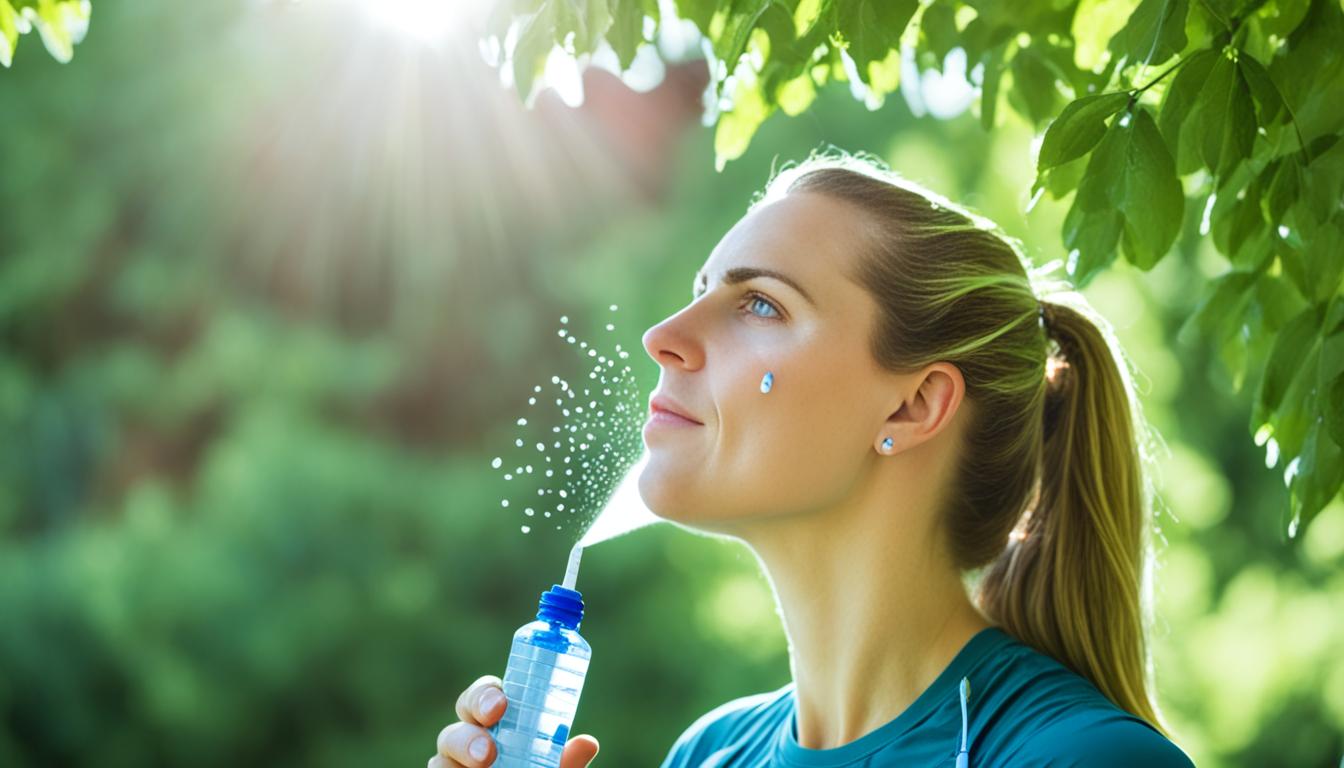Heat exhaustion happens when you’re out in hot weather for too long. It makes your body unable to cool down properly. This can cause you to sweat a lot, feel tired, dizzy, and even give you a headache. It’s important to spot these signs early and take action. This can prevent a more serious condition, heat stroke, which is dangerous.
It’s caused by being in hot places, not drinking enough water, and working too hard when it’s hot. The heat makes your body lose water through sweat. If you’re working out or being very active, you lose even more fluids. This can lead to dehydration and heat exhaustion.
To treat heat exhaustion, the first step is to move to a cooler place. This helps your body start to cool down. The second step is to drink water or sports drinks. These help replace the fluids you’ve lost. The last step is to rest. This gives your body time to recover and work normally again.
Although known ways to treat heat exhaustion work, scientists are looking into new ways. One of these is stem cell therapy. This new approach may help manage illnesses like heat exhaustion better. But it’s still being studied, so we need more research to be sure.
Key Takeaways:
- Heat exhaustion often comes from being in hot places for too long.
- It makes you sweat a lot, feel tired, dizzy, and gives you a headache.
- It’s important to move somewhere cool, drink fluids, and rest to treat it.
- Stem cell therapy might be a good way to treat heat illnesses in the future.
- But it’s best to avoid getting too hot in the first place by drinking lots of water and not overdoing it in the heat.
Risk Factors and Prevention of Heat Exhaustion
Heat exhaustion can happen from different causes. Knowing these risks helps people avoid getting too hot. Those who understand and act to prevent heat exhaustion can stay safe.
Risk Factors
Many things can lead to heat exhaustion:
- High temperature and humidity: Being in very hot and humid places raises the risk.
- Inadequate hydration: Not drinking enough water causes dehydration. This makes heat illnesses more likely.
- Physical exertion in hot environments: Doing hard activities in the heat taxes the body in cooling itself.
- Certain medications: Some drugs make it harder for the body to get rid of heat, increasing heat exhaustion risk.
- Underlying medical conditions: Health issues like heart disease or being overweight raise the risk.
- Age: Kids and older adults have a harder time dealing with extreme heat.
Prevention of Heat Exhaustion
To avoid heat exhaustion, it’s key to take steps:
- Stay hydrated: Drink lots of fluids, mainly water, all day to stay cool.
- Avoid excessive physical activity in hot weather: Don’t do too much outside when it’s very hot. Take regular breaks in cool places.
- Wear lightweight and breathable clothing: Pick clothes that are loose and light. They help air flow and keep you cooler.
- Seek shade or air-conditioned areas when outdoors: Find cool spots outside or go inside where there’s air conditioning.
- Use sunscreen: Put on sunscreen with a high SPF to prevent sunburn. Sunburn makes you hotter.
- Recognize early signs and symptoms: Be aware of early heat exhaustion signs like heavy sweating, tiredness, dizziness, and muscle pain. Act quickly if you notice them.
By taking these steps, you can keep cool and have fun outside, even when it’s hot.
Diagnosis and Treatment of Heat Exhaustion
Recognizing and treating heat exhaustion is vital. The first step is seeing the usual signs. These are heavy sweating, tiredness, feeling sick, getting dizzy, headaches, and muscle cramps. If you have these, act quickly to avoid worse problems.
Doctors check for heat exhaustion by looking at the symptoms and giving a physical. Sometimes, they do blood and urine tests to be sure it’s not something else.
To treat heat exhaustion, cool off, drink lots of water, and take a break. Get to a cooler spot and wear light clothes. You can also use cold towels or take a cool shower to lower your temperature.
Drinking water and sports drinks is the best way to rehydrate. Avoid alcohol and caffeine because they make dehydration worse.
Rest in a comfortable position to help you recover. If dehydration is bad, doctors may give you fluids through a vein.
First aid is important for heat exhaustion. If you see someone with these signs, move them to a cool place and give them water. Watch their heart rate and blood pressure. If things get worse, get medical help fast.
To deal with heat exhaustion, learn the signs and what to do. This helps you stay safe and recover quickly.
Conclusion
Heat exhaustion happens when your body gets too hot for too long. This can be because of high temperatures and wet air. Knowing how to spot the signs, the reasons behind it, and who’s most at risk is crucial. Preventive steps are key to avoiding heat illnesses. Quick diagnosis and the right treatment can stop heat exhaustion from becoming a life-threatening heat stroke.
Older ways of cooling down and keeping hydrated are still the best treatments. But new methods like stem cell therapy offer hope too. That said, we need more studies to confirm if stem cell therapy truly works against heat sicknesses.
To dodge heat exhaustion, stay up-to-date and take steps to protect yourself. Drink plenty of water, limit time in the sun, and know when to get help if you feel worse. With the right actions, you can stay safe and enjoy summer without worries. Remember, taking care is the best way to handle heat exhaustion.

